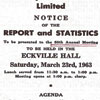Co-operative Endeavours
 The formation of the Medicine Valley Estonian Society not only established the groundwork for preserving and celebrating Estonian culture, but the Society also spurred the development of a co-operative association. The Eckville Co-operative Association was created in 1912 with numerous Estonian settlers serving as board members, including Fritz Kinna, Henry Kingsep, Charlie Raabis, and Carl Langer. Alberta's Estonian community firmly believed that a community would attain greater economic prosperity and flourish culturally if it voluntarily united through a jointly owned and democratically controlled enterprise to meet common economic, social, and cultural needs and aspirations. Members of the community-not just Estonians-invested shares in the enterprise, allowing the association to purchase facilities and expand its inventories. Shortly thereafter, the Eckville Co-operative Association operated a general store and, later, a lumber yard. For decades, citizens of Medicine Valley deemed the project a successful venture project due to its brisk business and shared profits. However, by the 1950s, profits began to subside as a result of increased market prices, mismanagement, and personnel issues. Regardless, the existence of the Eckville Co-operative Association reinforces the Estonian model of collectivism and community-based sharing initiatives. Moreover, the Estonian community's influence on the success of the Eckville Co-operative Association was invaluable.
The formation of the Medicine Valley Estonian Society not only established the groundwork for preserving and celebrating Estonian culture, but the Society also spurred the development of a co-operative association. The Eckville Co-operative Association was created in 1912 with numerous Estonian settlers serving as board members, including Fritz Kinna, Henry Kingsep, Charlie Raabis, and Carl Langer. Alberta's Estonian community firmly believed that a community would attain greater economic prosperity and flourish culturally if it voluntarily united through a jointly owned and democratically controlled enterprise to meet common economic, social, and cultural needs and aspirations. Members of the community-not just Estonians-invested shares in the enterprise, allowing the association to purchase facilities and expand its inventories. Shortly thereafter, the Eckville Co-operative Association operated a general store and, later, a lumber yard. For decades, citizens of Medicine Valley deemed the project a successful venture project due to its brisk business and shared profits. However, by the 1950s, profits began to subside as a result of increased market prices, mismanagement, and personnel issues. Regardless, the existence of the Eckville Co-operative Association reinforces the Estonian model of collectivism and community-based sharing initiatives. Moreover, the Estonian community's influence on the success of the Eckville Co-operative Association was invaluable.
Many citizens of Medicine Valley firmly believed in community enrichment. Altruism was a traditional virtue among early 20th century rural settlements, particularly within the Estonian community. Several organizations blossomed in the late 1930s and 1940s. Initially set up as a casual get-together where friends could converse and reminisce, the Country Ladies Aid morphed into a dedicated charitable organization which helped numerous groups and projects throughout the Medicine Valley. Similarly, the Royal Canadian Legion expanded its branches to Eckville in the mid-1940s. It operated out of a modest tin building and sponsored many community initiatives. The Legion funded upgrades to Memorial Park and provided uniforms for hockey and softball teams. Estonian members of the organization included Ralph Pihooja and Ralph Kingsep. The Lions Club of Eckville was also created in the mid-1940s. Its philosophy was to "determine community needs and develop a means of supporting them". Furthermore, the organization provided a convivial social environment for active members.








